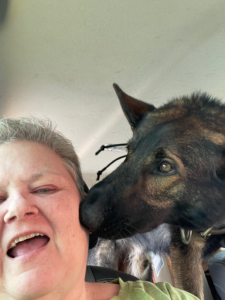Bringing a new pet into your home is an exciting and rewarding experience, but choosing the right breed is crucial. If you’re considering a German shepherd, you’re in for a treat. In this blog post, we’ll explore why German shepherds as family dogs make wonderful companions and offer practical tips for integrating them into your family life.
Table of Contents
Understanding the German Shepherd Breed
Origins and History
German shepherds, originally bred in Germany in the late 19th century, were created to herd sheep and protect flocks from predators. Max von Stephanitz, the breed’s founder, aimed to create an ideal working dog known for its intelligence, strength, and versatility. Today, German shepherds are beloved worldwide for their loyal and protective nature.
Key Characteristics
German shepherds are renowned for their intelligence, making them easy to train. Their physical traits include a strong, muscular build, erect ears, and a bushy tail. Their expressive eyes convey a sense of alertness and curiosity, making them excellent watchdogs. They typically weigh between 50 to 90 pounds and stand 22 to 26 inches tall at the shoulder.
Common Misconceptions
One common misconception is that German shepherds are aggressive dogs. While they can be protective, their temperament largely depends on their upbringing and training. With proper socialization and training, German shepherds can be gentle, loving family members.
Preparing Your Home for a German Shepherd
Creating a Safe and Comfortable Space
Before bringing home your new German shepherd, ensure your living space is safe and comfortable. Designate a specific area for your dog to sleep and rest. A cozy dog bed and a few favorite toys can help your new furry friend feel at home.
Necessary Supplies
Prepare by gathering essential supplies such as food and water bowls, a sturdy leash, a collar with identification tags, and grooming tools and a crate large enough for your adult dogs size with a divider to keep size small until your puppy grows. Investing in quality items will ensure your dog’s comfort and safety.
Child-Proofing and Dog-Proofing Tips
If you have children, it’s essential to child-proof and dog-proof your home. Secure loose cables, keep harmful substances out of reach, and use baby gates to restrict access to certain areas. This will create a safe environment for both your children and your new pet.
Socialization and Training
Importance of Early Socialization
Early socialization is critical for German shepherds. Introducing your puppy to various people, animals, and environments will help them develop into well-rounded, confident adults. Positive experiences during their formative months will shape their behavior and temperament. It’s vital you have the time and patience to carefully manage the first year after you bring your new puppy home.
Building a bond with a very intelligent soon to be large dog like a German Shepherd is vital and what happens in that first year will set the tone for the next 11 or 12 years your dog lives.
Basic Training Commands
Start with basic commands such as sit, stay, and come. These commands establish a foundation for more advanced training and help build trust between you and your dog. Consistency and positive reinforcement are key to successful training.
Advanced Training and Mental Stimulation
German shepherds thrive on mental challenges. Engage them with puzzle toys, agility courses, and advanced obedience training. Mental stimulation prevents boredom, which can lead to destructive behavior. Training sessions also strengthen the bond between you and your dog.
Daily Care and Exercise
Exercise Needs and Routine Activities
German shepherds are active dogs that require regular exercise. Aim for at least an hour of physical activity daily, including walks, playtime, and interactive games. Regular exercise keeps them physically fit and mentally stimulated. Don’t get a German Shepherd if you don’t have the time to train and exercise him. They are smart, powerful dogs who will make their own fun if you don’t build that bond daily.
Dietary Requirements and Feeding Schedules
A balanced diet is essential for your dog’s health. Consult your veterinarian to determine the best food for your German shepherd’s age, weight, and activity level. Establish a consistent feeding schedule to regulate their digestion and maintain a healthy weight. Since they are prone to bloat it’s best to divide the feeding into at least two feedings.
Grooming Tips and Regular Health Check-ups
Regular grooming is necessary to keep your German shepherd’s coat healthy. Brush their fur several times a week to reduce shedding and prevent matting. These dogs shed. A lot. I mean a LOT! If you don’t have tolerance and time this may not be the dog for you. Regular health check-ups with your veterinarian ensure your dog remains in optimal health.
Interaction with Family Members
Introducing a German Shepherd to Children and Other Pets
Introducing your German shepherd to children and other pets should be done gradually. Supervise initial interactions and teach your children how to approach and handle the dog gently. Positive experiences will foster a harmonious relationship.
Do not get this dog for a young child. They will not be able to manage his training. 12 and up could manage the dog with an adult supervising BUT, whoever actually trains the dog, in the dogs mind, is his owner. I don’t know many teenagers of any age who have the disciple to actually fully train a German Shepherd to the degree they need to become good family members. So if you get a GSD for your child be prepared it will likely be you who has to train and exercise the dog daily for 12-13 years.
Building a Bond Through Play and Positive Reinforcement
Playtime and training is the only way to bond with your German shepherd. They must have daily exercise and stimulation to become good family dogs. If you don’t have the time and end up with a problem dog it will be your fault not the dogs and rescues are full of such GSD.
Engage in activities like fetch, tug-of-war, and hide-and-seek. Use positive reinforcement to reward good behavior, strengthening your dog’s trust and loyalty.
Teaching Children How to Interact Safely and Respectfully
Educate your children on the proper way to interact with the dog. Teach them to respect the dog’s space and avoid disturbing them while eating or sleeping. Children do not know what they have not been taught and your puppy will get very big very fast. Teach your child to respect your GSD and not mistreat him in any way. If the child’s too young to understand, monitor all interactions closely and never leave a young child alone with your GSD. You’d never leave them alone with a loaded gun. Why do so with a 60-90 pound animal with a mouth full of knives? These are generally protective loving dogs but why chance it? This ensures a safe and respectful relationship between your children and your pet.
Dealing with Common Behavioral Issues
Addressing Separation Anxiety
Separation anxiety is common in German shepherds due to their strong bond with family members. Gradually acclimate your dog to being alone by leaving them for short periods and gradually increasing the duration. Provide toys and treats to keep them occupied.
Managing Barking and Chewing
Excessive barking and chewing can be addressed through consistent training. Identify the triggers for these behaviors and provide alternative outlets for your dog’s energy. Chew toys and interactive games can help redirect their attention. Exercise, exercise, exercise! Then train!
Tips for Consistent and Effective Discipline
Discipline should be consistent and gentle. Avoid harsh punishments, as they can damage the trust between you and your dog. Use positive reinforcement to reward desired behaviors and redirect unwanted actions. Don’t be afraid to seek professional help. 4
My GSD Jasper is one of the sweetest natured dogs I have ever had. He is smart and learns quickly. He also weighs 80 pound and could pull me over if he saw another dog and did more than once. I have the scars to prove it! It took work with a professional to get Jasper and me to the place I now have no worries he will try to pull me over regardless of what runs in front of him.
Enjoying Activities Together
Family-Friendly Activities and Outings with German Shepherds
German shepherds love spending time with their families. Plan family-friendly activities such as hiking, picnics, and beach outings. These activities provide physical exercise and strengthen the bond between you and your dog. Jasper loves to run along beside our trikes. Just be careful about high impact running while a puppy as GSD are prone to joint issues.
Importance of Keeping Them Mentally and Physically Active
Keeping your German shepherd mentally and physically active is crucial for their well-being. Engaging them in new experiences and activities prevents boredom and promotes a healthy, happy life. They need to train and exercise daily. I keep repeating that for a reason. If you don’t have the time this is not the dog for you.
Exploring Dog Sports and Training Classes
Consider enrolling your German shepherd in dog sports or training classes. Activities like agility, obedience trials, and scent work provide mental stimulation and physical exercise. These classes also offer opportunities for socialization with other dogs.
Conclusion
In conclusion, German shepherds make wonderful family dogs when their needs are met. By understanding their traits, preparing your home, and investing in training and care, you can enjoy a rewarding relationship with your furry friend. Remember, the key to a happy and well-adjusted German shepherd is time, effort, and love. If you’re ready to take the next step, consider consulting with a professional trainer or joining a local dog club to further enhance your experience as a German shepherd owner.

